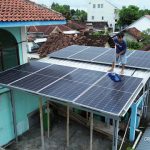Jakarta (Greeners) – Ministry of Environment and Forestry, or KLHK, and Ministry of Energy and Mineral Resources, or KESDM, sign a memorandum of understanding, MoU, on post mining activities to better environment management.
Under the MoU, holders of forest lent-use permit are obliged for environmental and social restoration post mining.
Bambang Hendroyono, secretary general of Ministry of Environment and Forestry, said that forest reclamation is compulsory for all forest lent-use permit holders on forested areas or on-site, meanwhile watershed rehabilitation is compulsory, such as replanting on critical lands, inside and outside of forest areas of the permit holders’ areas or off-site.
Based on KLHK data, Indonesia has 17,076 watersheds in areas of 189,278,753 hectares, of which 2,145 watersheds or 106,884,471 hectares are destroyed, requires restoration.
In addition, there are 14,006,450 hectares of critical lands in Indonesia.
“One of the main reason for critical lands is non-forestry activities, such as mining. Hence, mining industry is obliged to take the roles for restoration through ex-mining forests reclamation and watershed rehabilitation,” said Hendroyono, in Jakarta on Tuesday (23/04/2019).
READ ALSO: WALHI: Natural Exploitation Expected to be Rampant in 2019 for Indonesia
Furthermore, he said that watershed restoration under the 2019 Forest and Land Rehabilitation program is one of the national priority programs that requires real success in the fields.
“Up to March 2019, our records showed that reclamation implemented by IPPKH holders of 31,3512.67 hectares of 37.75 percent out of the total land clearing of 83,467.74 hectares, watershed rehabilitation just reaches 50,827.65 hectares or 18.19 percent out of the total of 527,984.32 hectares, land compensation reforestation reaches only 151.82 hectares or 1.39 percent out of the total of 10,789.09 hectares required to reforestation,” he said.
It will take effort to encourage permit holders to comply with their obligation required and according deadline, Hendroyono added, critical lands issues are no longer a singular problem as it needs to have the approach of coordination, integration, synchronization, and synergy among sectors to restore watershed areas.
Hence, the ministries signing the MoU will maximize the effort of tackling critical lands.
READ ALSO: JATAM : Regional Election Triggers Mining Permits Issuance in Indonesia
Ego Syahrial, secretary general of Ministry of Energy and Mineral Resources, said that the MoU signing is an effort to improve coordination between two ministries.
“Reclamation efforts need to be done seriously. Other than to prevent erosion or reduce the speed of runoff water, reclamation is aimed to protect lands not to be vulnerable and more productive, so reclamation is expected to produce added values for environment and create better condition compare before mining,” said Syahrial.
Under the 1945 Constitution, natural resources owned by the State and used for people’s welfare. Syahrial said that mining activities contribute to national development, including investment, employment and non-tax state revenue for a total of Rp50 trillion (US$10 billion) or 156 percent out of the 2018 target.
“Reclamation and post mining responsibilities are attached to IUP permit holders and they are obliged to submit ‘insurance’ by not eliminate the obligation of reclamation and post mining. The post mining activities are aimed to solve environmental and social recovery when mining ends with the main focus is people’s social economics sustainability,” he said.
Reports by Dewi Purningsih



















































